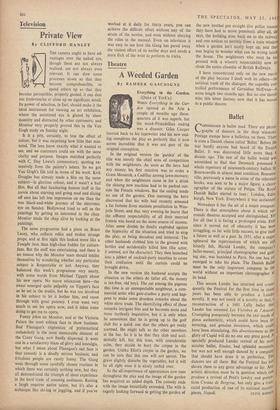Theatre
A Weeded Garden
By BAIVIBER GASCOIGNE
Everything in the Garden. (Duke of York's.)
In the original version the 'garden' of the title was merely the chief area of competition with the neighbours. As soon as the hero had any money his first reaction was to order a Grass Monarch, a Cadillac among lawn-mowers; and when the neighbours came in for a drink the shining new machine had to be parked out- side the French windows. But the ending made no use of the garden. One morning the hero discovered that his wife had recently amassed a fat fortune from matinee prostitution in Wim- pole Street; and that very evening he learnt that the affluent respectability of all their married friends was based on the same source of income. After some doubts he finally exploded against the hypocrisy of the situation and tried to stop the play, as being decadent and immoral. The other husbands clubbed him to the ground with bottles and accidentally killed him (the actor, it seemed, not the character). They then launched into a jabber of cocktail-party inanities to cover their confusion until the curtain could be brought down.
In the new version the husband accepts the situation as the others do (after all, the money is tax-free, old boy). The cat among the pigeons this time is an unrespectable neighbour, a com- mercial artist who gate-crashes a party and hap- pens to make some drunken remarks about the white slave trade. The electrifying effect of these remarks intrigues him and he becomes more and more tactlessly inquisitive, but it is only when he announces that he is going up to the golf club for a quick one that the others get really alarmed. He might talk to the other members at the bar. So it is he that they club and acci- dentally kill, but this time, with considerable calm, they decide to bury the corpse in the garden. Unlike Eliot's corpse in the garden, we can be sure that this one will not sprout. The grave slightly disturbs the vegetables, but it will be all right once it is nicely turfed over.
So the all-importance of appearances now runs throughout the play and the image of the garden has acquired an added depth. The comedy ends with the image beautifully extended. The wife is eagerly looking forward to getting the garden of the new brothel put straight (for police reasons they have had to move premises); after all, she says, the building does back on to the railway; and one notices so terribly from a train window when a garden isn't nicely kept up, and the') one begins to wonder what can be wrong inside the house. The neighbours who must be int. pressed with a whore's respectability now in' elude the entire clientele of British Railways.
I have concentrated only on the new merits of the play because I dealt with its others—the satirical truth of the dialogue, the superbly con' trolled performance of Geraldine McEwan—at some length two months ago. But no one should miss this bitter fantasy now that it has moved to a public theatre.






































 Previous page
Previous page